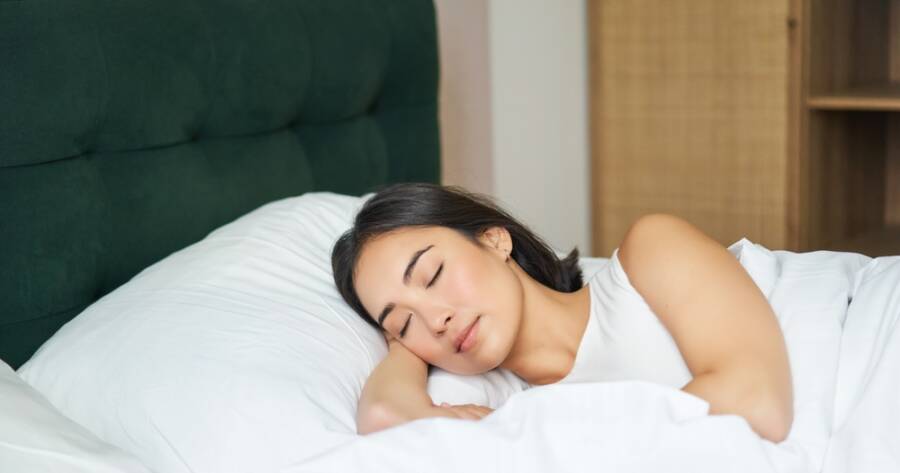Everyone knows that sleep is essential for good health and well-being, but did you know that poor sleep can have a significant impact on how people age, especially when it comes to their skin? Sleep plays a vital role in the body’s ability to repair itself and maintain youthful, glowing skin. When sleep is consistently disrupted, it can accelerate the aging process and lead to various skin issues. Explore the link between poor sleep and skin health, as well as tips to help you sleep better.
Sleep and Skin Repair: The Vital Connection
During a good night’s sleep, the body enters a restorative state where it works on repairing and rejuvenating itself. This includes the repair of skin cells. When we sleep, our bodies produce more collagen, a protein responsible for keeping skin firm and youthful. Collagen also helps to reduce the appearance of fine lines and wrinkles.
However, when you don’t get enough sleep, your body doesn’t produce collagen at the same rate. This means that over time, your skin can lose its elasticity and develop wrinkles more quickly. A lack of sleep also increases the production of cortisol, a stress hormone that can break down collagen and further accelerate the aging process.
Dark Circles and Puffiness: How Sleep Affects Your Eyes
One of the most immediate and noticeable effects of poor sleep is the appearance of dark circles and puffiness under your eyes. During deep sleep, the body works to repair damaged cells and flush out toxins that accumulate throughout the day. When sleep is interrupted, this process is impaired, leading to the buildup of fluids under the eyes, which causes puffiness.
Lack of sleep also results in poor circulation, meaning blood does not flow as efficiently around the face, especially the delicate under-eye area. This lack of circulation can make the skin appear dull and lead to the development of dark circles. While there are temporary solutions like using creams or cold compresses, the real remedy lies in improving your sleep quality.
Dry and Dull Skin: Dehydration from Lack of Sleep
Dehydration is another common consequence of poor sleep, and it directly affects the appearance of your skin. When you’re not getting enough rest, your skin loses its ability to retain moisture, resulting in dryness and dullness. Sleep is the time when your skin’s barrier function is strengthened, which helps to lock in moisture. Without this essential restoration period, your skin becomes more susceptible to dryness and irritation.
Additionally, when you don’t sleep well, the body’s production of certain skin-protecting compounds like hyaluronic acid and ceramides is reduced. These compounds are essential for maintaining hydration, and a lack of sleep decreases their levels, making your skin more prone to dryness and flakiness. Over time, chronic dehydration from poor sleep can even lead to premature aging signs, such as rough texture and fine lines.
Increased Risk of Skin Conditions
Chronic poor sleep not only accelerates the visible signs of aging, but it can also increase the risk of certain skin conditions. Studies have shown that a lack of sleep can disrupt the balance of the skin’s natural barrier, making it more vulnerable to infections, inflammation, and acne.
When the body is sleep-deprived, it has a weakened immune response, which means it is less able to fight off skin irritants and harmful bacteria. This can lead to increased outbreaks of acne, eczema, and other skin conditions. Poor sleep also causes an imbalance in hormone levels, which can trigger the overproduction of oils that clog pores and lead to breakouts.
Stress and Its Impact on Skin Health
Poor sleep often leads to stress, which in turn can wreak havoc on your skin. When you’re stressed, your body releases cortisol, the “stress hormone.” High levels of cortisol can cause a range of skin problems, including acne flare-ups, breakouts, and inflammation. The hormone imbalance caused by stress can also lead to more noticeable fine lines and wrinkles.
Chronic stress and poor sleep combined create a vicious cycle that is hard to break. Stress impairs sleep quality, and poor sleep worsens stress levels, which can make skin issues even more pronounced. If you’re constantly under stress and not getting enough sleep, it can take a significant toll on your skin health.
Prioritize Sleep for Better Skin Health
The connection between sleep and skin health is undeniable. Poor sleep accelerates aging, damages the skin’s ability to repair itself, and increases the risk of skin problems. By prioritizing good sleep habits, you can give your skin the time it needs to rejuvenate and maintain a youthful, glowing appearance.
Simple changes, such as establishing a consistent sleep schedule, creating a relaxing bedtime routine, and minimizing screen time before bed, can help improve sleep quality and ultimately enhance your skin health.

